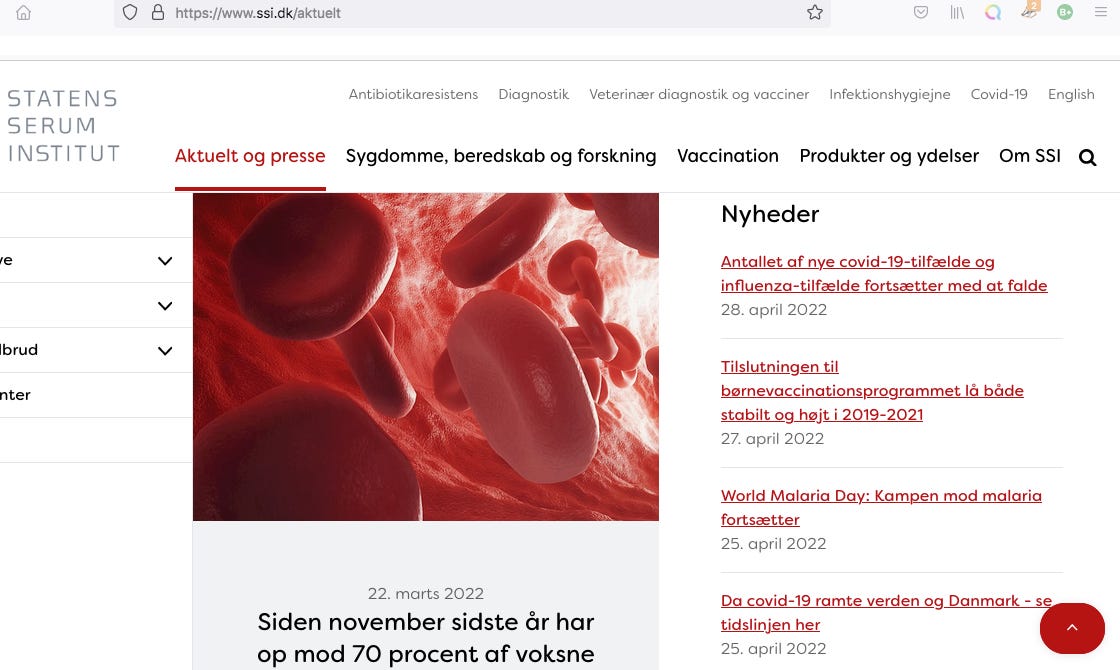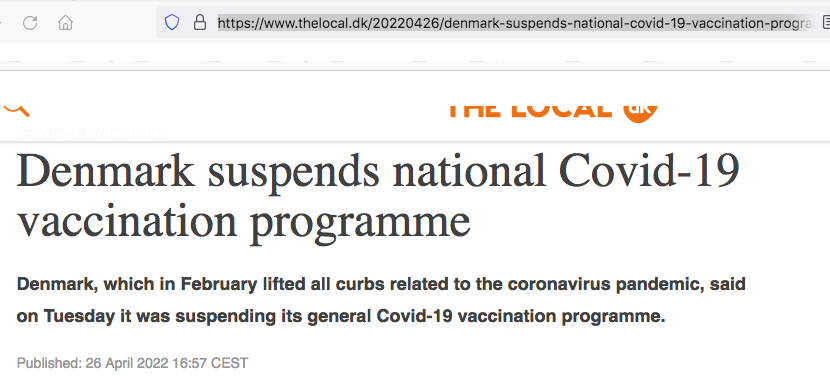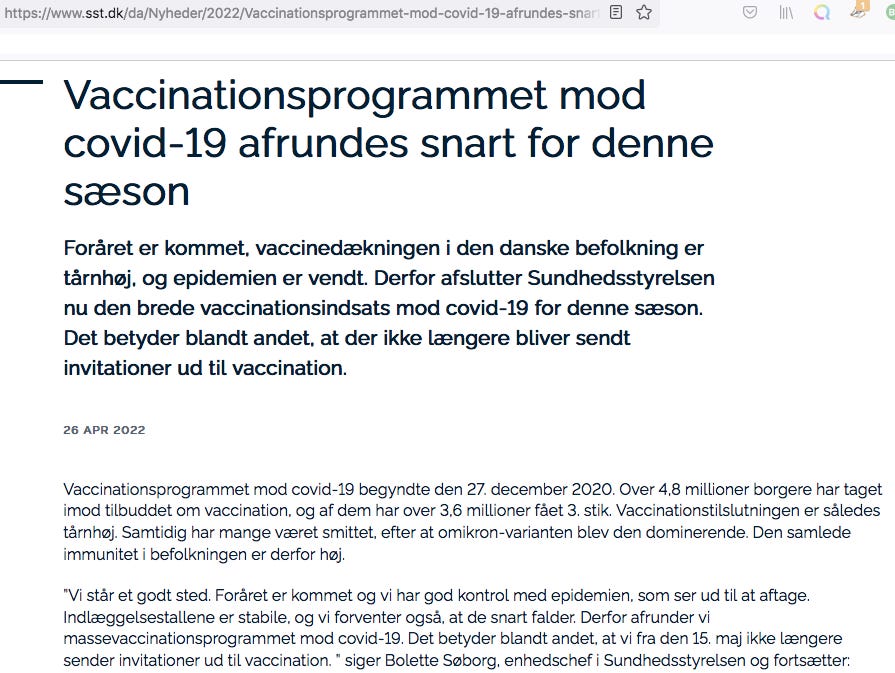Covid in the North: Denmark to 'pause' its Vaxx Campaign in mid-May--Norwegian Perspectives
What's good for the Norsemen, is good for the other Nordics--why claims of 'victory' may be premature, with plenty of (earlier) indications from Norway
I know, it’s all over the place—Denmark halts Covid-19 injections, now reported by virtually all dissenting ‘stackers, too. Here are Steve Kirsch and Igor Chudov in almost celebratory mode, so, instead of weighing in on it right away, I’d like to do something else.
First up, some ‘history’ of this admittedly (potentially) ‘significant’ moment. In English, the story broke yesterday, as per CNBC, which posted an article entitled ‘Denmark becomes the first country to halt its Covid vaccination program’ (28 April 2022).
Thanks to Igor Chudov, who also included another piece by Ladbible.com entitled ‘Denmark Becomes First Country In The World To Stop Its Covid-19 Vaccine Program’, I learned that a virtually identical article—meaning that there are only semantic alterations, if compared to the CNBC piece—appeared a day earlier already (27 April 2022).
And this made me feel a bit…awkward, and it did so for two reasons: first of all, that ought certainly to be ‘bigger’ news than it was; and, secondly, as I’m not someone who trusts whatever crap is reported by legacy media outlets, I checked the Danish Serum Institute’s website for bespoke announcements and…crickets:
Neither their Danish nor their English equivalent showed any such announcement (yet, it’s 6:05 a.m. on 29 April 2022 as I type this), and neither did their dedicated Covid-19 site.
So I went back to the news items cited by Igor and checked them thoroughly—and I found the proximate origin of apparently both articles: a piece that appeared on thelocal.dk on 26 April 2022 at 4:57 p.m. CEST (note that time stamp), which I reproduce below in full:
Noting that the epidemic was under control and that vaccination levels were high, the Danish Health Authority said the country was in a ‘good position’.
‘Therefore we are winding down the mass vaccination program against Covid-19’, said Bolette Søborg, director of the authority’s department of infectious diseases.
Around 81 percent of Denmark’s 5.8 million inhabitants have received two doses of the vaccine and 61.6 percent have also received a booster.
Denmark noted a drop in the number of new infections and stable hospitalisation rates.
While invitations for vaccinations would no longer be issued after May 15th, health officials anticipate that vaccinations would resume after the summer.
‘We plan to reopen the vaccination programme in the autumn. This will be preceded by a thorough professional assessment of who and when to vaccinate and with which vaccines’, Søborg said.
As a wave of the Omicron variant hit the country last November, Denmark intensified its immunisation campaign, accelerating access to booster shots and offering a fourth dose from mid-January to the most vulnerable.
Yep, that’s it. All of it. If you wish to check the journalistic integrity and acumen of both pieces that appeared in CNBN and LadBible.com, you may note that the former almost verbatim copy-pasted the above-cited piece (of course without attribution). The latter outlet, LadBible, at least linked to thelocal.dk piece.
The best news item to report on this matter, by the way, is the third item Igor linked to. Penned by Dawn Geske on 28 April 2022, it’s the best of these pieces, and it appeared in the International Business Times.
Ms. Geske extensively cites official statements and provides links to the Danish Health Ministry’s official statement, dated 26 April 2022. From the English brief (found at the bottom of the page; my emphases):
The general covid-vaccination programme in Denmark has been paused for the time being. It is still possible to get vaccinated
The vaccine coverage is high in the Danish population and the epidemic situation is favourable. We can therefore close the general vaccination programme for the spring and summer, which means that new invitations to be vaccinated no longer are being sent.
However, as an individual, it is still possible to get vaccinated if you wish to start or finish a vaccination programme, and for example get a booster shot. A fourth dose/second booster shot is also available for a limited group of persons depending on an individual medical evaluation.
We will continue to monitor the development of the epidemic closely and we are ready to resume the general vaccination programme should the need arise before a new covid-19 season is expected to begin in the autumn.
If you care to closely read the Danish text, you may be able to figure out what the Danes mean:
You can still be vaccinated over the spring and summer, and we continue to recommend vaccination to people at particularly increased risk of a serious course of Covid-19 disease. This is especially true for people over the age of 40 and for pregnant women if they are unvaccinated. We also continue to recommend that you complete your started vaccination course…
The National Board of Health continues to recommend that a small group of people with a very weakened immune system be vaccinated with a 4th dose. This relates to, e.g., cancer patients who receive chemotherapy, or patients who suffer from many serious diseases, which together can lead to a weakened immune system.
‘We have made a thorough assessment of who should be offered a 4th dose at this time. Our assessment is that over the summer it is only relevant for a small group of people with very weakened immune systems or similarly severe multi-disease. When autumn comes, we will decide again, e.g., whether it may be relevant to offer the 4th dose to a wider segment of society, and when the best time will be to do so’, says Bolette Søborg…
The Danish Health and Medicines Authority’s assessment is that there will probably be a need to vaccinate against Covid-19 again in the autumn. This is because the virus that causes Covid-19 is an unstable virus that can mutate, just as we saw with Omicron. At the same time, we expect to see an increase in infection again as we go from autumn to winter.
‘We plan to open the vaccination program again in the autumn. Prior to this, a thorough professional assessment must be made of who and when to be vaccinated and with which vaccines. We expect to present a plan for the overall framework for the 2022/23 season before the summer holidays’, says Bolette Søborg.
There you have it: while I greatly appreciate the efforts by Steve Kirsch, Igor Chudov, and others, I remain wary. I also remember vividly the (partially) misleading statements by Alex Berenson about the ending of mandates in Austria.
If living among Scandinavians for almost two years now taught me anything, it’s that they are quite transparent about what they will do and won’t do. Generally speaking, Scandinavian governments and public authorities appear also somewhat more reactive (responsive) to public opinion, which constitutes a marked difference to, say, Central Europe or North America.
If you doubt my claim, please check out this piece from mid-January—which features a full-blown apology by legacy media outlets who beg forgiveness for continuing to dis-/mis-inform the public: ‘For ALMOST two years, we—the press and the population—have been almost hypnotically preoccupied with the authorities’ daily Corona narrative’, Ekstrabladet’s editorial (7 Jan. 2022) opened. I suppose the moment you see such an opener in, say, the NYT or WaPo would be the first time…
Hence, if the Danish Health Ministry says that they won’t pressure people now (or from 15 May onwards), they do so because injection uptake has stalled. Costs for ‘reminding’ Danes to ‘get vaccinated’ are, therefore, supposedly also too high for these results, hence the ‘shift’ in public policy.
What the Danes will also do is that they will come up with a new plan before the summer, just as they said they will.
My reading is: reports of ‘victory’ may be premature.
Comment: the Norwegian Perspective
I think what we are observing here isn’t the much hoped-for ‘victory’ by ‘responsible people’ over ‘predisposed vaccinators’. This is merely the next step in the ongoing struggle between ‘technocracy’ vs. ‘democracy’, whatever the latter might mean these days.
I’ve seen this episode play out in Norway in early 2022, with the government struggling, for about two weeks, to first kick out ‘public health officials’ from the regular press conferences. Members of the ‘public health establishment’ were customarily expecting to be ‘there’ for the long haul, but in early January of this year, the government ‘disinvited’ them. This was followed by a two-week media blitz by unelected ‘public health officials’ who contradicted virtually everything the government said. My detailed account can be found here (13 Jan.) and here (14 Jan.).
This tug-of-war only stopped when the government didn’t budge, with the Institute of Public Health issuing corresponding recommendations that the mandates do more harm than good, hence their abrogation in late February and early March. My detailed account is here (10 Feb.)
The IPH came back in early April with a new assessment, highlighting the ‘bonus feature’ of the impending out-of-season influenza outbreak (which never materialised). Covid-19 in Norway was quite ‘under control’, as the IPH wrote in its most recent (current) assessment. They also said that ‘the vaccines’ offer ‘good protection’ (ahem, as per data for week 16) and that while no mandates are warranted now, there’s still uncertainty about the future.
Just how much uncertainty, one might ask? Here’s Bergens Tidende with a report about what Camilla Stoltenberg, Head of the IPH (and sister of NATO Sec-Gen Jens, by the way), said about this particular issue back in late March (paywalled):
To contribute to the overall strategy and planning, we drew up four scenarios for the development between May 2022 and September 2023. They differ especially in the virus’ ability to spread and the associated disease severity for those who become infected…
The best-case scenario is a variant (which may be Omicron) that spreads easily, which causes little serious disease and has limited seasonal effects. This means some infections through the summer, but only a moderate autumn or winter wave.
A less optimistic scenario would be a variant (it may be Omicron) that spreads well, causes little serious illness, but has significant seasonal effects so that there is little infection throughout the summer, but a large autumn or winter wave.
A pessimistic scenario is a new variant with even greater transmission ability than Omicron that does not show greater disease severity. It quickly becomes dominant and causes a very large wave.
The worst-case scenario is a new variant with even greater transmission ability than Omicron that, at the same time, also causes more severe disease. This variant may quickly become dominant and causes a very large wave with many seriously ill individuals.
I suspect that the Danish will come up with a quite similar assessment (my emphasis):
In the future, we will live with the virus, normalise society, continue to vaccinate those who need it, monitor developments and improve preparedness, writes the IPH.
Lest you ask yourself what the IPH means by ‘living with the virus’, the above-cited piece in Bergens Tidende also comes with a vision of differentiated measures:
Normal everyday life with increased preparedness, i.e., normal day-to-day operations and no restrictions.
The next step is called low action level, which may mean the reintroduction of a tailored testing, isolation, infection tracing, and quarantine régime. No additional measures will be introduced.
The moderate level is the third level of action, which means several infection control measures, incl. masks on public transport, table service in restaurants only, the re-introduction of social-distancing at restaurants, stricter requirements for events and local assessments concerning the so-called traffic light model in schools and kindergartens. There may also be a recommendation for the increased use of home offices.
At a high level of alert, some additional restrictions are proposed, affecting both private homes and gatherings, public events, sports and leisure activities. The use of masks is to be extended to retail stores, shopping centers, and restaurants, and there is a recommendation to avoid public transport and shops during rush hour. In schools and kindergartens, municipalities are supposed to re-introduce the traffic light model, while arrangements are implemented for partly digital teaching in higher education. Cessation of alcohol sale after a given time may be considered as well.
At the strictest level, number restrictions for private homes will be tightened. In addition, non-essential venues may be closed or subject to additional limitations, as will be libraries, museums, and similar establishments. In addition, restaurants, cafes, and bars may remain open for takeaway only. The implementation of public events is largely prohibited, while several restrictions are introduced for sports and leisure activities.
The same piece by Bergens Tidende also noted what has been implemented by now, i.e., the cessation of free, low-access testing:
The Norwegian Directorate of Health recommends that we end symptom-based testing based on infection control purposes and move on to testing for clinical indication.
So, no symptoms, no testing. That also means that whatever restrictions may or may not be imposed later this year—remember: the IPH plans ahead to late 2023—cannot be based on indiscriminate PCR testing.
Bottom Lines
I wonder why the Norwegian situation—which predates and exceeds the Danish decision—didn’t make a bigger splash. Let’s hope that we’ll soon see actions like in 2009 with the Swine Flu vaccination fvckup.
I suspect that it’s not because these aren’t reasonable propositions. I suspect that it’s much more ‘sensationalist’ to play up the Danish case. Like earlier in the ‘pandemic’, Norway didn’t do things much differently than its Swedish, Danish, Icelandic, and Finnish neighbours, but they generally keep a lower profile.
Be that as it may, this is good news, and I hope this post contributes to dispel some ‘myths’ about these aspects.







The state of Mississippi did the same recently. Tennessee, ivermectin OTC, and New Hampshire ivermectin through a doctor. With 26 states considering similar legislation. The Eu and BG next hopefully?
Txs! Nice "investogation"... agree on your doubts and conclusions. It'll also depend from Ukraina tv serie.... sory for my sarcasm but they deserve it, especially Nato and its leader.
For many of your points you described, time has come to shut down EU or at least EU Commission as it is/has been.
have a nice wend!